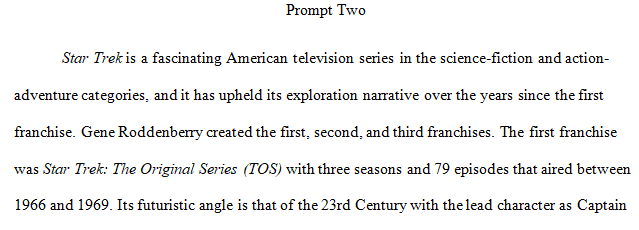
Consider the terms dystopia vs. utopia. Star Trek is considered to be a utopian narrative, where limitations and issues of the real world (race, gender, sexuality, xenophobia etc.) are examined in a relatively safe space.
Prompt Two
- Respond to TWO of the following prompts in at least 600-800 words each.
- Respond to ONE prompt in 1200 to 1600 words.
Clearly mark which option you are taking, and clearly identify which prompts you are answering. For either option, make sure that you discuss at LEAST TWO EPISODES. You may also refer to any of the short stories or to the Vint handbook if you’d like, but that is not mandatory, and you won’t be penalized if you don’t.
- Consider the terms dystopia vs. utopia. Star Trek is considered to be a utopian narrative, where limitations and issues of the real world (race, gender, sexuality, xenophobia etc.) are examined in a relatively safe space. However, Star Trek is also a rather limited utopia, as is any fictional landscape. At this point in our viewing and analysis of Star Trek episodes, do you consider the Federation a utopia, a limited utopia, or a dystopia? Why? (There isn’t a correct answer but support your claim with analysis of appropriate episodes.)
- The overarching Star Trek narrative is one of “boldly going,” of exploration, particularly of making contact with other species and “aliens.” And yet, as we’ve seen in some episodes, that primary mission of exploration is complicated by other factors, issues, challenges, and even other desires and missions. Reflect on the shift between TOS, TNG and DS9 and consider how these “exploratory missions” and encounters with other races have changed in attitude to focus less on the militaristic/ranked aspects and more on the “exploratory” side of the narrative.
- Consider all of the ways we have discussed in class regarding how we distinguish between “us” and “the/the Other” (race, appearances, disabilities, logic, language, physical composition, gender expectations etc.) Identify one which you think is the most significant and use 2 of the episodes to elaborate how Star Trek approaches the “Other.”
- As Star Trek moves from TOS, TNG, DS9, Voyager, and Enterprise, it seems that the series continually moves into more personal stories, centered around the characters themselves as opposed to the adventure and expansionist origins of TOS. What effect does this shift from the large and grandiose into the more close and personal have in understanding specifically the issue of race in Star Trek?
support articles
Fiction: Horatio Hornblower (excerpts read and discussed in class: (CLICK ME) (Links to an external site.) https://www.youtube.com/watch?v=njHimjJ57OQ ; H. G. Wells, “The Star” (http://www.online-literature.com/wellshg/17/ (Links to an external site.))
Fiction: Harlan Ellison, “‘Repent, Harlequin!’ Said the Ticktockman” (https://www.d.umn.edu/~tbacig/cst1010/chs/ellison.html (Links to an external site.)); article of interest: https://www.vox.com/culture/2018/6/29/17518928/harlan-ellison-star-trek-grudge-science-fiction-rip
Fiction: C. L. Moore, “Shambleau” (full text: http://www2.hawaii.edu/~davink/MYTHOLOGY%20CLASS/RESPONSES/shambleau.html (Links to an external site.); hear the author read the story:
Click Me (Links to an external site.)) https://www.youtube.com/watch?v=dj5JNPHh3ZM&feature=youtu.be
Fiction: Stanley G. Weinbaum, “A Martian Odyssey” (https://www.gutenberg.org/files/23731/23731-h/23731-h.htm (Links to an external site.))
Answer preview…………………………………..
 apa 1446 words
apa 1446 words